Steven Spielberg's film "Munich" has finally arrived at the DVD rentals in Japan. Spielberg has been labelled a "self-hating Jew" by the usual suspects for exploring the moral ambiguities of an assassination campaign.
Meanwhile, now and not 30 years ago, on the West Bank:
"Palestine has been so reduced and so humiliated that it is now a country where the Occupying force can walk into a main city at nightfall, can walk down the main street of that city and kill a man and then walk away again as if that is a damn right of theirs and no one is going to blink an eye at it.
"It is not their damn right to come and terrorize the people of a city night after night after night on some hyped up 'security' reason! This is no human being's right.
"I have been accused of not understanding how people are feeling on the other side of the Wall. People have written to me 'You don't know what it is like to be driving behind a bus when it explodes' and I say this is true. But I do know what it is like to see fifteen thugs walk down a main street of a city at nightfall and murder in cold-blood outside a family restaurant and then walk away again.
"I call that the worst kind of terror."
This is an eyewitness report. These targeted assassinations continue to happen on a regular basis. How long will it take before the Israelis understand they can't just stroll around and murder Arabs (subhumans) with impunity? They were surprised and indignant when Hizbullah fought back in August and killed about 120 Israeli soldiers. I am sorry for the young men who died but I can't find it in my heart to blame Hizbullah for resisting. They were fighting for control of their own towns and villages. Israeli troops invaded Lebanon, not the other way around. The home team wasn't doing anything wrong by fighting back and defending their own territory. In fact, good for them.
Opinion pieces, travel articles, places and people; lots of poetry; commentary on current events and history and whatever else shows up on the radar. Articles have been numbered (since Sept. 2004). Go n-eiri an t-adh leat.
Thursday, August 31, 2006
Friday, August 25, 2006
271. Elephants

Elephants cavorting
on the floor
could drive other dancers
to the door
because, perhaps,
they are somewhat large,
slightly larger, in fact,
than most Americans:
with delicate tact
they try not to barge
and step upon your toes.
God knows
you’d remember that
(a foot mashed flat)
as they politely strain
to stay with the beat
in spite of the pain
and pulsating heat
and not very much
in the way of feet.
Casual reporting
overlooks
the serious strands
of elephant thought:
their love of books
their modest demands.
They never catch fire,
not precisely,
assidiously self-taught,
they hardly require
adulation,
or congratulation,
but want to act nicely,
and politely.
Elephants are serious,
elephants are good,
elephants, understandably,
are misunderstood:
they eat plants, they step around ants,
and behave with perfect PC,
more thoughtful, in fact, than you or me.
Lions and tigers leave them alone,
they have never been beasts of prey:
they are dignified, large, and grey.
And there is this passing rumour
that they have a sense of humour,
they can chuckle at the inside joke,
and especially like the ones that poke
at politics and religion ... O what fun!
It may be true they weigh a ton
but they’re by and large a laid-back folk,
who mull over each and every decision.
Babar, as you may well expect,
is the only Elephant superstar,
he tingles their hearts, both near and far,
(“Le Roi Babar ” gets a lotta respect)!
Talking English is still quite new
dans le Centrale Afrique
so, therefore, only a very few
of younger elephants can speak.
Their elders chide them and repair
to discuss the plays of Moliere,
and trumpetting, rumpetting,
(thank God we’re off the dance floor)
tear apart Voltaire.
Wednesday, August 23, 2006
270. Kamakura
(Click on any picture to expand; use Back button to return to blog)

Last Monday (Aug. 21st), in the midst of the blazing and relentless summer heat that the country has been experiencing this year, we spent the day in Kita (north) Kamakura and Kamakura itself visiting a number of historical and rather famous Zen temples, including Engaku-ji and Shokozan (once known as the divorce temple, since women could take refuge here from abusive husbands).


These temples date from the period when Kamakura wrested control over the Japanese islands from the court in Kyoto (ca. 1194-1333) and although much renovated and rebuilt these temples still retain a direct link to those days when Zen (Ch'an) Buddhism was being introduced to Japan from China and when the two great Mongol invasions of the country were repulsed by huge storms -- the original "kami-kaze", or divine winds.



An expanded set of 30 photos may be viewed by going to kaboodle.

Last Monday (Aug. 21st), in the midst of the blazing and relentless summer heat that the country has been experiencing this year, we spent the day in Kita (north) Kamakura and Kamakura itself visiting a number of historical and rather famous Zen temples, including Engaku-ji and Shokozan (once known as the divorce temple, since women could take refuge here from abusive husbands).


These temples date from the period when Kamakura wrested control over the Japanese islands from the court in Kyoto (ca. 1194-1333) and although much renovated and rebuilt these temples still retain a direct link to those days when Zen (Ch'an) Buddhism was being introduced to Japan from China and when the two great Mongol invasions of the country were repulsed by huge storms -- the original "kami-kaze", or divine winds.



An expanded set of 30 photos may be viewed by going to kaboodle.
Tuesday, August 15, 2006
269. Lebanon -- what now?
As the belated UN Ceasefire goes into effect after five long weeks of war – and just how secure this ceasefire will be, one wonders – questions are being raised and answers sought not only among those who were directly involved in the conflict, but in government cabinet sessions around the world.
What will be the political results of this war? Who has lost, who has won? What do these events augur for the future of Israel and the Middle East in general?
In military terms the war has come to a temporary halt without a clearcut victory on either side. This counts as a de facto Israeli defeat since it was inconceivable not only to their US allies but to the Israelis themselves that the all-powerful and American-supplied IDF could be stopped in its tracks by a despised group of Arabic militants.
The war was allowed to continue as long as it did in order to provide time for an Israeli military victory. When initial Israeli attacks into south Lebanon met with stiff resistance the Israelis asked for more time to finish the job. The US and Britain (PM Tony Blair, if not his Labour Party) stalled on ceasefire negotiations to give the Israelis their chance. The additional time led to more Israeli casualties on the ground (and many more Lebanese civilian casualties from the air) but there was no noticeable improvement in the Israeli military situation. With world opinion growing ever more hostile the Israeli demands for more time could not be sustained indefinitely. An initial, one-sided, and deeply-flawed ceasefire proposal has now been replaced with something slightly, but not much, better. No doubt the young Israeli reservists who have been bearing the brunt of the difficult fighting will be quietly relieved. The angry perception of military failure, however, will lead to a political firestorm in Israel.
How will Israel react?
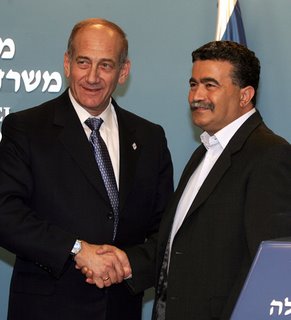 PM Ehud Olmert and Minister of Defense Amir Peretz
PM Ehud Olmert and Minister of Defense Amir Peretz
Prime Minister Ehud Olmert is definitely on the way out. Calls for his resignation have already been raised in the Knesset and it is highly unlikely he can long survive the political fallout from this war. Look for a bitter war of words in the Israeli press between civilian and military leaders as each side blames the other. If Olmert goes, which is almost certain, we can expect the sacking or perhaps pre-emptive resignation of the IDF Commander, Dan Halutz. Halutz, the first Israeli CIC from the air force, believed in winning wars from the air and was the architect of the devastating airstrikes on Lebanon which caused so many civilian casualties and which roused world opinion to a deafening chorus of outrage.
 Dan Halutz, Israeli military commander in chief
Dan Halutz, Israeli military commander in chief
Ordinary Israelis were astounded and angry at the world’s disapproval (after all, they had been getting away with murder on the ground for decades) and could not understand how they were suddenly losing the PR battle around the world. Lose it they did, and definitively so, in spite of the best efforts of the US media to mislead, as usual, the public at home. Not only in the Muslim world – which has few if any illusions about Israel – but also in places as far apart as China, Russia, South America, Africa, India, almost any country one might care to name, the Israelis were being seen on the world’s TV screens as brutal aggressors, murderers of women and children, heartless attackers of fleeing refugees and ambulances and aid convoys. It will take years, perhaps a generation, for Israel to expunge these negative images.
Lebanon and Hizbullah
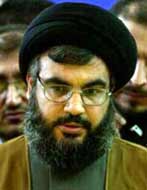 Sayyid Hassan Nasrullah, leader of Hizbullah
Sayyid Hassan Nasrullah, leader of Hizbullah
Within Lebanon and the wider Arab world (indeed the Islamic world as a whole which embraces non-Arabic nations such as Iran, Afghanistan and Pakistan, also Indonesia and Malaysia, large parts of India and the southern Philippines, not to mention large populations of Islamic emigrants in Europe and North America) Hizbullah comes out as a clear winner as does their charismatic and relatively young leader Hassan Nasrullah. Nasrullah is calm and shrewd and whenever he appeared on al-Manar TV during the crisis he avoided over-the-top emotional tirades and simply warned the Israelis that he would match their bombing attacks with more and more missiles and would possibly target Tel Aviv.
In retrospect, in spite of the loss of civilian lives in Israel (some of them Israeli Arabs with no bomb shelters provided for them to go to) Hizbullah rocket attacks on Israel were not an indiscriminate lashing out at the “Zionist” enemy so much as a measured response to the Israeli bombing of Lebanon. When the Israelis stopped bombing for a 48-hour period Hizbullah stopped sending over rockets. When the Israelis resumed, so did Hizbullah. The short-range Katyusha rockets don’t have the vaunted accuracy of smart bombs but it would appear Hizbullah was actually trying to go after military targets. BBC and CNN reporters in Haifa went on camera in shirt sleeves because the central city was relatively safe whereas their counterparts in Beirut and Tyre and the Bekaa Valley were all wearing flak jackets.
The Israelis have weapon factories and ammunition stores and military installations dotted around the whole northern part of the country as Jonathan Cook, a free-lance writer based in Nazareth has been trying to explain to everybody for the past few weeks but without much success. The Israeli complaint that the “cowardly” Hizbullah were hiding among the civilian population is entirely hypocritical given that the Israelis do exactly the same thing. Western reporters are prevented from mentioning the existence of military installations in the suburbs of Haifa, Nasiriyah and Nazareth under the draconian censorship rules that Israel imposes on foreign reporters – and which few of these reporters ever remember to mention.
What happens next?
Hizbullah has gained a great deal of respect within Lebanon. This can only add to their growing political influence. The dismissive image of Hizbullah as a Shi’ite militia has been replaced during the course of the war by a wider Lebanese appreciation of the role of Hizbullah as defenders of the country. This perception cuts across all the old sectarian divides. The Israelis were quick to claim (Netanyahu on the BBC Hard Talk program, for example) that the Lebanese Christians and Sunnis were cheering on Israel and hoping for a defeat of Hizbullah. This may have been partly true at the beginning of the war but it is totally untrue now. Even super-safe (supposedly) Jounieh, a Christian enclave north of Beirut, got pounded with bombs as did Sunni and Druze areas as the crazily arrogant and ultimately self-defeating Israeli air campaign went on. In their declared attempt to cut off Hizbullah weapon supply corridors the Israelis shut down the whole transportation and communications infrastructure of Lebanon. What was understood in the beginning as an Israeli attack on Hizbullah soon came to be perceived as an all-out attack on the Lebanese state. And who was standing up to the Israelis? Who was defending Lebanon? Not, you can be sure, the Lebanese army.
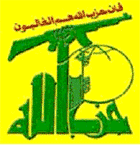 The defiant flag of Hizbullah
The defiant flag of Hizbullah
It remains to be seen how far Hizbullah will benefit politically from their (perceived) role as national defenders during the recent war, but benefit they will. That much can be easily predicted. It is indicative of their growing political awareness that they downplay their former religious agenda, never all that strong, and now even field local Christian candidates in election campaigns. These guys are not stupid. They are on their way to becoming major political players in Lebanon, first and foremost, and, by extension, a model for the wider Arab political world. I can’t help but wonder (maybe it’s only me) if they haven’t been stealing a few peeks at the Sinn Fein playbook in Ireland.
America, Bush, GWOT
What about America? Well, what about it – does it really matter? We all know what is going to happen. Bush is like one of the old Bourbon kings of France. He only sees what he wants to see and he learns nothing from changes in events and circumstances. We can expect more of the same blind stupidity. Hizbullah will be ostracized and condemned, again, as an “Islamofascist” terrorist organization. It never has been that, not by any stretch of the imagination. Hizbullah came out foursquare and condemned Al Quaida and the 9/11 attacks, but who cares to remember that now?
America will continue to support Israel and ship them new weapons (but not through Shannon Airport!!) in the hope that a new, better and improved Israeli regime will launch a fresh attack and exterminate these hardy defenders of their native soil. Whatever happened to the old republican virtues (small “r”) in which the Minutemen of Lexington and Concord held a position of respect? In these days of geopolitical conniving and imperial overreach the foundations of the American Republic are conveniently forgotten and set aside, and the same national aspirations which gave rise to the independence of America are denied to others.
The Global War on Terror? It hasn’t been that for some time although Al Quaida is still out there, largely undisturbed. What we have now is a global war on everyone including dissidents, the poor, and ethnic minorities within the USA itself. If you are a Muslim or a black or brown foreigner, God help you.
Sunni regimes
The conservative Sunni regimes in Saudi Arabia, Egypt and Jordan are probably quaking in their boots and with good reason. A successful Shi’ite grassroots organization like Hizbullah that can take on the Israelis and not lose (not losing means you win) is the last thing they need with their own volatile and predominantly poor populations chafing under restrictive quasi-military rule. Hizbullah has aroused feelings of pride and defiance throughout the Arabic world which cuts across the Sunni-Shia divide. It will be interesting to see how they will build upon this support, but build upon it they will. These people are intelligent, disciplined, and dedicated. They won’t be going away anytime soon.
For related articles, please click here
What will be the political results of this war? Who has lost, who has won? What do these events augur for the future of Israel and the Middle East in general?
In military terms the war has come to a temporary halt without a clearcut victory on either side. This counts as a de facto Israeli defeat since it was inconceivable not only to their US allies but to the Israelis themselves that the all-powerful and American-supplied IDF could be stopped in its tracks by a despised group of Arabic militants.
The war was allowed to continue as long as it did in order to provide time for an Israeli military victory. When initial Israeli attacks into south Lebanon met with stiff resistance the Israelis asked for more time to finish the job. The US and Britain (PM Tony Blair, if not his Labour Party) stalled on ceasefire negotiations to give the Israelis their chance. The additional time led to more Israeli casualties on the ground (and many more Lebanese civilian casualties from the air) but there was no noticeable improvement in the Israeli military situation. With world opinion growing ever more hostile the Israeli demands for more time could not be sustained indefinitely. An initial, one-sided, and deeply-flawed ceasefire proposal has now been replaced with something slightly, but not much, better. No doubt the young Israeli reservists who have been bearing the brunt of the difficult fighting will be quietly relieved. The angry perception of military failure, however, will lead to a political firestorm in Israel.
How will Israel react?
 PM Ehud Olmert and Minister of Defense Amir Peretz
PM Ehud Olmert and Minister of Defense Amir PeretzPrime Minister Ehud Olmert is definitely on the way out. Calls for his resignation have already been raised in the Knesset and it is highly unlikely he can long survive the political fallout from this war. Look for a bitter war of words in the Israeli press between civilian and military leaders as each side blames the other. If Olmert goes, which is almost certain, we can expect the sacking or perhaps pre-emptive resignation of the IDF Commander, Dan Halutz. Halutz, the first Israeli CIC from the air force, believed in winning wars from the air and was the architect of the devastating airstrikes on Lebanon which caused so many civilian casualties and which roused world opinion to a deafening chorus of outrage.
 Dan Halutz, Israeli military commander in chief
Dan Halutz, Israeli military commander in chiefOrdinary Israelis were astounded and angry at the world’s disapproval (after all, they had been getting away with murder on the ground for decades) and could not understand how they were suddenly losing the PR battle around the world. Lose it they did, and definitively so, in spite of the best efforts of the US media to mislead, as usual, the public at home. Not only in the Muslim world – which has few if any illusions about Israel – but also in places as far apart as China, Russia, South America, Africa, India, almost any country one might care to name, the Israelis were being seen on the world’s TV screens as brutal aggressors, murderers of women and children, heartless attackers of fleeing refugees and ambulances and aid convoys. It will take years, perhaps a generation, for Israel to expunge these negative images.
Lebanon and Hizbullah
 Sayyid Hassan Nasrullah, leader of Hizbullah
Sayyid Hassan Nasrullah, leader of HizbullahWithin Lebanon and the wider Arab world (indeed the Islamic world as a whole which embraces non-Arabic nations such as Iran, Afghanistan and Pakistan, also Indonesia and Malaysia, large parts of India and the southern Philippines, not to mention large populations of Islamic emigrants in Europe and North America) Hizbullah comes out as a clear winner as does their charismatic and relatively young leader Hassan Nasrullah. Nasrullah is calm and shrewd and whenever he appeared on al-Manar TV during the crisis he avoided over-the-top emotional tirades and simply warned the Israelis that he would match their bombing attacks with more and more missiles and would possibly target Tel Aviv.
In retrospect, in spite of the loss of civilian lives in Israel (some of them Israeli Arabs with no bomb shelters provided for them to go to) Hizbullah rocket attacks on Israel were not an indiscriminate lashing out at the “Zionist” enemy so much as a measured response to the Israeli bombing of Lebanon. When the Israelis stopped bombing for a 48-hour period Hizbullah stopped sending over rockets. When the Israelis resumed, so did Hizbullah. The short-range Katyusha rockets don’t have the vaunted accuracy of smart bombs but it would appear Hizbullah was actually trying to go after military targets. BBC and CNN reporters in Haifa went on camera in shirt sleeves because the central city was relatively safe whereas their counterparts in Beirut and Tyre and the Bekaa Valley were all wearing flak jackets.
The Israelis have weapon factories and ammunition stores and military installations dotted around the whole northern part of the country as Jonathan Cook, a free-lance writer based in Nazareth has been trying to explain to everybody for the past few weeks but without much success. The Israeli complaint that the “cowardly” Hizbullah were hiding among the civilian population is entirely hypocritical given that the Israelis do exactly the same thing. Western reporters are prevented from mentioning the existence of military installations in the suburbs of Haifa, Nasiriyah and Nazareth under the draconian censorship rules that Israel imposes on foreign reporters – and which few of these reporters ever remember to mention.
What happens next?
Hizbullah has gained a great deal of respect within Lebanon. This can only add to their growing political influence. The dismissive image of Hizbullah as a Shi’ite militia has been replaced during the course of the war by a wider Lebanese appreciation of the role of Hizbullah as defenders of the country. This perception cuts across all the old sectarian divides. The Israelis were quick to claim (Netanyahu on the BBC Hard Talk program, for example) that the Lebanese Christians and Sunnis were cheering on Israel and hoping for a defeat of Hizbullah. This may have been partly true at the beginning of the war but it is totally untrue now. Even super-safe (supposedly) Jounieh, a Christian enclave north of Beirut, got pounded with bombs as did Sunni and Druze areas as the crazily arrogant and ultimately self-defeating Israeli air campaign went on. In their declared attempt to cut off Hizbullah weapon supply corridors the Israelis shut down the whole transportation and communications infrastructure of Lebanon. What was understood in the beginning as an Israeli attack on Hizbullah soon came to be perceived as an all-out attack on the Lebanese state. And who was standing up to the Israelis? Who was defending Lebanon? Not, you can be sure, the Lebanese army.
 The defiant flag of Hizbullah
The defiant flag of HizbullahIt remains to be seen how far Hizbullah will benefit politically from their (perceived) role as national defenders during the recent war, but benefit they will. That much can be easily predicted. It is indicative of their growing political awareness that they downplay their former religious agenda, never all that strong, and now even field local Christian candidates in election campaigns. These guys are not stupid. They are on their way to becoming major political players in Lebanon, first and foremost, and, by extension, a model for the wider Arab political world. I can’t help but wonder (maybe it’s only me) if they haven’t been stealing a few peeks at the Sinn Fein playbook in Ireland.
America, Bush, GWOT
What about America? Well, what about it – does it really matter? We all know what is going to happen. Bush is like one of the old Bourbon kings of France. He only sees what he wants to see and he learns nothing from changes in events and circumstances. We can expect more of the same blind stupidity. Hizbullah will be ostracized and condemned, again, as an “Islamofascist” terrorist organization. It never has been that, not by any stretch of the imagination. Hizbullah came out foursquare and condemned Al Quaida and the 9/11 attacks, but who cares to remember that now?
America will continue to support Israel and ship them new weapons (but not through Shannon Airport!!) in the hope that a new, better and improved Israeli regime will launch a fresh attack and exterminate these hardy defenders of their native soil. Whatever happened to the old republican virtues (small “r”) in which the Minutemen of Lexington and Concord held a position of respect? In these days of geopolitical conniving and imperial overreach the foundations of the American Republic are conveniently forgotten and set aside, and the same national aspirations which gave rise to the independence of America are denied to others.
The Global War on Terror? It hasn’t been that for some time although Al Quaida is still out there, largely undisturbed. What we have now is a global war on everyone including dissidents, the poor, and ethnic minorities within the USA itself. If you are a Muslim or a black or brown foreigner, God help you.
Sunni regimes
The conservative Sunni regimes in Saudi Arabia, Egypt and Jordan are probably quaking in their boots and with good reason. A successful Shi’ite grassroots organization like Hizbullah that can take on the Israelis and not lose (not losing means you win) is the last thing they need with their own volatile and predominantly poor populations chafing under restrictive quasi-military rule. Hizbullah has aroused feelings of pride and defiance throughout the Arabic world which cuts across the Sunni-Shia divide. It will be interesting to see how they will build upon this support, but build upon it they will. These people are intelligent, disciplined, and dedicated. They won’t be going away anytime soon.
For related articles, please click here
Sunday, August 06, 2006
268. The War in Lebanon

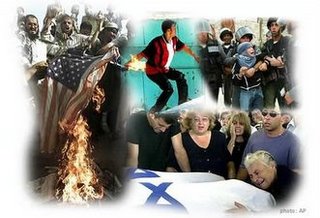
O God, they’re at it again!
During the last 60 years, or ever since the creation of the State of Israel, hardly a week or month has gone by without some incident of political violence in which civilians have been attacked or killed. There have been major outbreaks of violence in the form of all-out wars in 1948, 1956, 1967, 1973, 1982, and now, since July 12 of this year, we have witnessed Israeli airstrikes on Lebanon. Apart from the full-scale invasion of Lebanon in 1982 there have also been bombing campaigns by Israel in 1978 and 1996 before the Israeli army finally withdrew its troops from southern Lebanon in 2000. Internally Israel has been engaged in almost continuous military actions against the Palestinians, most notably in reaction to the “intifadas” (uprisings) of 1987 and 2000. Now they are at it again in Gaza.
Israel lays claim to the sympathies of the West as a fellow “democracy” surrounded by hostile enemies who wish to destroy the Jewish state and push its inhabitants into the sea. This is very emotive stuff but it has gradually lost the power to convince (except, of course, in the United States) since originally well-disposed European nations have taken stock of the overwhelming military superiority of Israel vis-à-vis its opponents and the number of times that Israel has been the actual instigator of armed conflict in the region (every single time, in fact, with the exception of the Egyptian attack in 1973). It’s a little bit like the Boy Who Cries Wolf in that the neighbours soon learn to take these pleas with a pinch of salt. Woe, then, to Israel should she really come under the sort of devastating attack that would actually threaten her existence!! Of course, America will probably still be there to pull the irons out of the fire should things ever get that far – and it seems highly unlikely they ever will – whereas the Europeans, grown ever more disillusioned with Israeli behaviour, would be much slower to react.
Does Israel have a right to exist?
Yes. It will always be a troublesome entity because of its location and because of some of its rather more dubious Zionist claims to legitimacy. Nevertheless, the state of Israel is internationally recognized and its right to exist will be defended by the United Nations, even to the extent of military intervention if necessary. In spite of Israeli fears to the contrary, the world will not stand by and allow Israel to be destroyed. Only Israel itself can do that. There is a growing belief among non-partisan outside observers that the attitudes and policies of successive Israeli governments have done much to exacerbate the problems of the region and that these policies have increased rather than reduced tensions with Israel’s neighbours and its internal population of Palestinians. In other words, Israel has generally created more problems than it has solved, rarely if ever accepts responsibility for these problems, and consistently engages in angry but well-orchestrated attacks on any groups or individuals who have the temerity to challenge its behaviour.
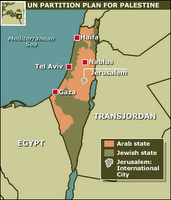
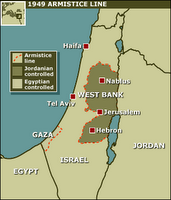
The real question here is which Israel has the right to exist? Is it the Israel of the original UN Partition Plan of 1947, the expanded Israel that followed the 1948 war, or the even more expanded Israel which came into being after the 1967 war? (see maps above and below). In 1967 Israel took over -- and continues to occupy -- the West Bank and East Jerusalem (formerly part of Jordan), Gaza (formerly Egyptian -- the Sinai Peninsula was returned in 1982), the Golan Heights (formerly Syrian) and a small enclave along the Syrian-Lebanese border known as Shebaa Farms. UN Resolution 242 (November 22, 1967) specifically called for Israel to withdraw from these occupied territories.
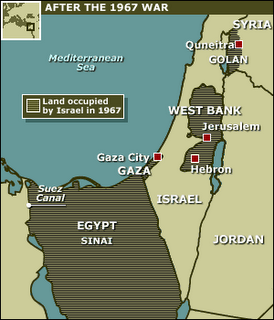
There have been 98 UN resolutions concerning Israeli actions and the vast majority of them have been critical. Nevertheless, the only UN Resolution that Israel cares to quote is Resolution 1559 calling on the Lebanese government to disarm Hezbollah, (“There are pro-Israeli and anti-Israeli sources that have commented on the amount of United Nations resolutions against Israel. Israeli Prime Minister Yitzhak Shamir commissioned an analysis of UN voting concerning Israel. According to results of this study, from 1967 to 1988 the Security Council passed 88 resolutions directly against Israel and during that span, Israel was condemned 43 times. In the UN General Assembly, 429 resolutions against Israel were passed, and Israel was condemned 321 times”. – source, Wikipedia).
Is Israel justified in its attack on Lebanon?
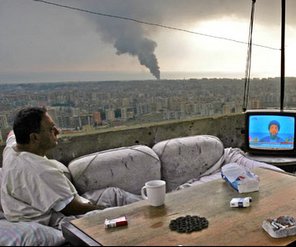
No. The rationale put forward is totally out of sequence. We are told Israel has a right to destroy the Lebanese infrastructure (roads, bridges, the main airport, oil storage facilities, TV and cellphone relay towers, factories, etc.) because Hizbullah fired rockets into Israel. This is not what happened. The Hizbullah attacked an Israeli army patrol, killed three soldiers and captured two. Their intent was to set up a prisoner exchange for some of the 900 or so Lebanese held without charge in the Israeli military prison system. Israel sent in a team (there is still a dispute as to which side of the border the original incident occurred)to chase down the Hizbullah fighters and one of their tanks ran over a landmine and a further four Israeli soldiers were killed. One more soldier was killed in an ambush as the Israelis attempted to retrieve the bodies. The next day Israel initiated air strikes on southern Lebanon and hit the airport in Beirut. Hassan Nasrullah, the Hizbullah leader, told Israel to stop bombing Lebanese targets or Hizbullah would fire rockets into Israel. That’s how that got started.

Next, we hear that Syria and particularly Iran are engaged in a proxy war with Israel (and the United States) by supplying Hizbullah with missiles and military training. Even as this complaint was doing the rounds of all the media outlets, the USA was shipping new bombs into Israel by way of Prestwick airport in Scotland. This is apparently OK. The bombs were redirected through Prestwick (much to the fury of the Scots) because my own government in Ireland refused landing rights at Shannon airport. Good for them. So why can’t Hizbullah and Israel make a deal? We (Hizbullah) will cut all ties with Syria and Iran if you (Israel) promise to cut all ties with the USA? Well, I can’t see that happening any time soon, but it amazes me that people can't see the parallels.
Are we being told the truth?
No, of course not. When has that ever happened? The so-called Peace Process between Israel and the Palestinians is a total sham and everybody knows it. It’s a smokescreen to hide the fact that Israel wants to retain the occupied territories and somehow get rid of the Palestinians. This is why they are building illegal settlements, usually on strategic hilltop positions; this is why they confiscate Palestinian land, refusing building permits to Palestinian families (if they do build, their homes are destroyed by bulldozers); this is why they set up military roadblocks and checkpoints that make it nearly impossible for Palestinians to get their goods to market, attend schools and universities, get to hospitals for imminent childbirth and other medical emergencies, or in simple terms, lead normal lives; this is why they have set up a highway system connecting settlements that only Israeli citizens can use. The list goes on. It is literally unbelievable, except nobody seems to be paying any attention to what is actually happening to these people. These daily humiliations are totally buried in American press and TV coverage. Whenever Palestinians react with anger they are painted as mindless terrorists and Israel is praised for “defending” itself by shooting a few of them. Kids throw stones against tanks and when the soldiers catch them, they beat them and break their arms. Those are the lucky ones, the ones who don’t get shot. Unlike press and television outlets from the rest of the world, the American news media hardly ever mentions the brutal military occupation which gives rise to these responses. The whole situation is reported totally out of context as if the Palestinians were unstable people addicted to violence. Could you imagine this happening in your own neighbourhood? Probably not, but if it were to happen, what would be your reaction? Fight or flight? The Palestinians have nowhere to run to.
Ehud Barak, military hero and former Israeli prime minister, was once caught off guard by a reporter's question:
"What would you have done, sir, if you had been born a Palestinian?"
Barak thought a moment and replied candidly,"I imagine that if I were a Palestinian of the right age, I would, at some stage, have joined one of the terror organizations."
Right, exactly. Source under Quotes.
In the meantime, for those who are interested in Israel and the Middle East,there is a longer article on this blog entitled 'Great Hatred, Little Room'.
By clicking on the links button below you will be brought to a kaboodle.com page with a collection of nearly a dozen recent articles on Lebanon and Gaza.
| links |
| www.kaboodle.com |
Friday, August 04, 2006
267. Breaking News

Whatever it takes,
between station breaks,
allow your mouth to do the walking
and never once stop talking;
Anderson Cooper
induces stupor,
but, consistently, most of all,
what really drives me up the wall
is Colonel This and Brigadier That
who woof-woof at us rata-tat-tat
with their steely eyes and lantern jaws
about events, yet never the cause
of the unfolding dreadful situation
in a small and faraway foreign nation
when any fool can easily tell
that they don't know really what the hell
is in actual fact transpiring;
this is sad, it is totally uninspiring,
as innocent people continue to die
and they focus on what, but can't say why:
half-cocked blather, ill-prepared,
"news" by and for the thought-impaired.
Under the moon and under the sun
all humankind must learn,
that those to whom evil is done
WILL do evil in return.
Subscribe to:
Comments (Atom)